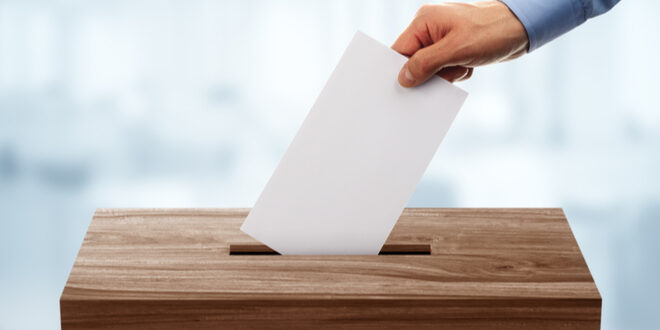Measure Q, which will appear on the Nov. 8 ballot, would raise the city’s sales tax from 7.5 percent to 8.5 percent. City officials say they need more revenue to maintain Ontario’s current standard of living, but not everyone agrees.
On Nov. 8, Ontario residents will vote on Measure Q, a proposed one percent sales tax increase.
If approved by a majority of voters, Measure Q – formally known as the City of Ontario Local Services Measure – would increase the city’s sales tax from 7.5 percent to 8.5 percent and raise about $95 million a year, according to a city staff report.
The money would help pay for infrastructure projects and improvements while enhancing existing services and programs, the report says.
“Ontario is a 131-year-old city with some very old infrastructure that needs to be replaced, and replacing it is going to cost us millions of dollars,” City Manager Scott Ochoa said. “Measure Q will give us a chance to do it right. It’s about our quality of life, and [its passage] is crucial to the city.”
Those improvements will only get more expensive the longer they’re delayed, Ochoa added.
Ontario officials have identified an estimated $1.2 billion in unfunded infrastructure and neighborhood improvements that it could complete in the next 10 years if Measure Q is approved: $242 million in improvements to the city’s water and sewer systems, including $100 million each for storm drain improvements and a water purification system.
The latter would recover nearly three billion gallons of wastewater annually.
Nearly $60 million would be spent to upgrade playgrounds, skate parks, picnic areas, snack bars and ballfields, while another $41 million would go toward public safety enhancements, starting with improving 911 emergency responses.
One hundred and eighteen million dollars would be used to install low-cost, high-speed fiber optic services to residential, commercial and public spaces. Citywide access to free WiFi would also be established.
Finally, $15 million would pay for fighting homelessness and improving mental health.
Riverside, Corona, Redlands, San Bernardino, Montclair, Claremont and Pomona all have a sales tax rate of 8.75 percent or higher, while Fontana, Rancho Cucamonga have a 7.75 percent sales tax rate, same as Ontario.
Under that rate, if someone makes a $1 purchase, Ontario receives one cent, San Bernardino County gets 2.8 cents and California receives 3.9 cents. Should Measure Q pass, Ontario’s share would rise to two cents while the other numbers would remain the same.
Measure Q would add 10 cents to every $10 worth of taxable goods sold in Ontario, excluding several categories not affected by the sales tax, including groceries, medical, rent, utilities and personal services.
“Increasing the sales tax makes the most sense because virtually everyone pays it, and much of it will come from people from out of town who are visiting or doing business in Ontario,” Ochoa said. “No one wants to pay taxes, but at least in this case people will get to vote on it. They will decide the issue.”
The council voted unanimously Aug. 2 to place Measure Q on the ballot. One council member said he did so reluctantly.
“If you have high expenses and not enough revenue to pay for what you need, then you need to do something,” Councilman Alan Wapner said. “I’ve never been in favor of raising taxes, especially sales taxes. But the state is putting so much pressure on us with unfunded mandates – things we’re ordered to do without getting any funding help – that I don’t know that we have a choice.”
But critics of Measure Q maintain that Ontario already receives enough sales tax revenue to pay its bills, having generated $103 million in the 2020-’21 fiscal year. They also argue that the initiative contains no “sunset clause” – meaning it could be around forever – and that there are better ways for Ontario to ensure its longterm financial security.
For example, Redlands has a proposal on its November ballot that would raise the business license fee on warehouse-distribution facilities, which would raise revenue without hurting working families.
“I don’t see any justification for Measure Q,” said Chris Robles, 12-year Ontario resident and founder of www.FairOntario.com, a nonpartisan community outreach and organizing group. “The council has done nothing to educate people about what this really is.”
Robles and Samuel Crowe, an attorney and former councilman who has lived in Ontario since 1960, co-wrote a list of objections to Measure Q, arguing that, among other issues, it’s ill-timed when working families are struggling with inflation.
“Every family in Ontario is dealing with rising gas and food prices and an increased cost of living,” the pair wrote. “This is the worst time to burden hard-working residents with another cost increase.”
City officials have also been less-than-candid in explaining to residents how revenue from Measure Q will be spent, according to Robles.
“They’re telling people it’s about better police and fire departments, that it’s about repairing the streets, but none of that is true,” Robles said. “They say it’s about unfunded mandates, but where are they? They don’t exist.”
If the city could justify it a lot of people would support Measure Q, including me,” Robles said. “But it can’t.”
Wapner admits he’s not sure how he will mark his ballot.
“I’m not sure I’ll vote for it, because I really don’t like raising taxes,” he said “But because of the pressure we’re getting from the state we might not have a choice. If it passes, it will be a lot of additional revenue for the city.”
 IE Business Daily Business news for the Inland Empire.
IE Business Daily Business news for the Inland Empire.



Where can I obtain a “NO on Measure Q” yard sign?
I will speak to an unfunded mandate. The state of California has been obligated for the last hundred years to maintain Euclid Avenue. Euclid Avenue still does not have storm drains. When it rains Euclid turns into river jeopardizing residents and public safety personnel. The water goes over what’s left of the curbs and the dirt gets eroded from the park ways. When the state does pave Euclid the pavement never gets grounded down and you get this dome shaped street with the curbs being swallowed up and they are falling apart. The state was supposed to trim the peppers and gravelia’s on Euclid and the city took that over because they weren’t doing it in a timely manner and the trees were getting too tall. And we could add the downtown side walks to list of lack of maintenance. All of this could cost well over $100 million dollars.